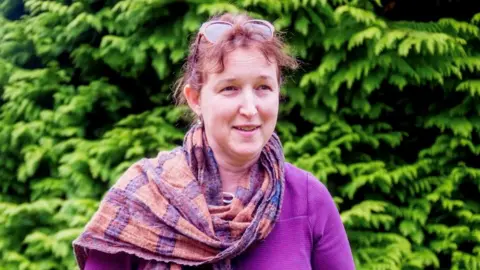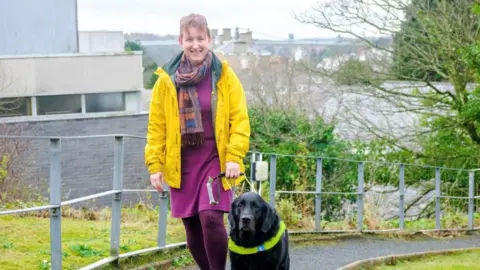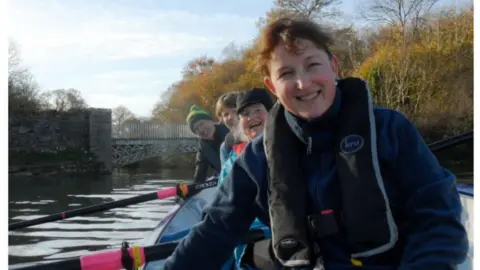'Why I mentor blind and partially-sighted people'
 Rhiannon tudor edwards
Rhiannon tudor edwardsGrowing up in the early seventies, with two energetic parents and a younger brother, Rhiannon Tudor Edwards' childhood seemed idyllic.
Her home was filled with a menagerie of pets, holidays were spent on Barmouth beach, splashing in rock pools.
But this changed aged four, when, on a trip to the countryside, her parents realised she could not see to pick bilberries from a bush.
After a week in hospital undergoing tests, she was diagnosed with a degenerative eye condition, Retinitis pigmentosa, that would, her parents were told, leave her completely blind by the age of 15.
It is a diagnosis that might have shattered the world of some parents, but not Rhiannon's.
Instead, her mother Eleri, a resilient woman of strong faith, and father Richard, a professor of medicine, embraced the news, firing up their determination that their girl would succeed in life.
Rhiannon, who lives in Bangor, Gwynedd, said: "Throughout my childhood, all I remember is their encouragement.
"They knew I had this disorder that would rob me of my vision, stealing my sight fraction by fraction, year on year.
"But my father repeatedly told me I was never to be discriminated against.
"He said, 'It's what's behind the eyes that matter. You have a good brain'.
"My mother too didn't seem worried. She simply encouraged me to do what I could each day."
Despite this encouragement, attending mainstream school was not easy.
Recalling these times, Rhiannon said: "I had two major horrors - being asked to read aloud in class and playing netball. I would get hit in the face by the ball.
"There was no help for me; I was just expected to get by on using my wits."
As predicted, Rhiannon's vision gradually deteriorated and by the age of 17, she could no longer read text.
 Gwyneth Rees
Gwyneth ReesYet, still, this gradual descent into darkness or, in Rhiannon's case, a world of unpleasant flashing colours, similar to a migraine, did not hold her back.
Age 16, she attended Atlantic College in Vale of Glamorgan, studying for the International Baccalaureate, as well as learning to sail and rock climb.
She said: "Again, it was hard and I struggled with my increasingly deteriorating vision.
"I recall going to WHSmith to find paper with strong lines so I could see to write.
"I got by on listening and having a good memory, but I also worked incredibly hard, putting in long, long hours."
'Work ethic'
It was this work ethic that propelled Rhiannon forward - first to an economics degree at Aberystwyth University, then a master's at the University of Calgary in Canada, followed by a PhD at York.
The result of her graft was a lecturing post at Bangor University, before she was headhunted along with colleague Prof Dyfrig Hughes to co-found the university's Centre for Health Economics and Medicines Evaluation (CHEME).
A prestigious appointment looking at how scarce healthcare resources can be best used to meet the needs of society, it is a role that has seen Rhiannon and her team produce more than 200 papers and bring in millions in research grants to Wales.
Rhiannon did this while raising two children, Will and Non, with her husband Paul, and coping with deteriorating sight to the point when, aged 32, she was registered blind.
She said: "I have found the continual loss of my sight over the years very difficult.
"Now, age 51, I have about 2% left, just in the very periphery of my vision.
"I have been through all the stages of grief and have used counselling to help me through.
"One of the worst things emotionally was when I realised I could no longer ride my horse independently - something I loved.
"But, though grateful to Guide Dogs For The Blind, I found receiving my guide dog, Vikki, a black lab-retriever, the hardest transition of all.
"I went from one day managing without a dog, to another day needing it.
"I had become a visibly disabled person and I struggled with people's assumptions.
"I still recall sitting on a train with Vikki and a complete stranger saying, 'Looking at you, dear, reminds me how lucky I am'."
Throughout these personal challenges, however, Rhiannon's career has thrived, her centre growing to include 20 staff and 10 PhD students.
 Rhiannon Tudor Edwards
Rhiannon Tudor Edwards She said: "The main problem I find in work, is that I am trying to have an academic career and I can't read.
"I run a paperless office, I struggle not having a diary I can flick through, and have to hold everything in my head."
To help her, Rhiannon relies heavily on technology - laptops and phone that can read texts and emails aloud.
Fellow staff and students know to introduce themselves at each meeting, although she can usually recognise them by the way they walk.
She also benefits from the government's Access to Work scheme, providing her with an assistant two mornings a week to read exam papers and help with writing grant applications.
Perhaps Rhiannon's biggest passion, though, is encouraging other blind and partially-sighted people to access work.
According to the RNIB, only 26% of registered blind and partially-sighted people in the UK are in work, compared to 74% of the working age general public.
In her work capacity, Rhiannon has also learnt that of those who attend low-vision clinics, more than 40% have depression.
Yet, half of these people are receiving no treatment.
This is why she now volunteers as a mentor for other blind and partially-sighted people, helping them achieve what they want from life.
'Blindness and depression'
Rhiannon said: "Both the RNIB and the North Wales Society for the Blind put me in touch with young people who need help.
"Often, they are out of work and don't feel like they have any choices. Or they expect to work for a blind charity.
"I want to shake them - tell them there's a whole world out there."
A major stumbling block to some people finding work, she feels, is that not every blind person is given a guide dog.
She said: "You need to be using a daily route to get a guide dog, so if you are not regularly getting out and about, you are unlikely to get one.
"But not having a guide dog can be a big obstacle to accessing work.
"I have seen people who have lost their sight in their teens and have virtually no mobility or independence, they are completely dependent on their parents.
"In those cases, I will often provide work experience, helping them gain confidence.
"My role is to encourage a strong work ethic, making sure they can use public transport and get to work on time and dress professionally.
"They then leave with a strong CV and the skills needed to get on the employment ladder."
For Rhiannon, lucky enough to have been brought up fiercely independent and ambitious, she is glad to be giving back.
She said: "Working and earning money is so important for all of us, whether we have a disability or not.
"Yet, sighted people don't realise how hard the workplace is for the non-sighted.
"Thanks to my parents, I have refused to be beaten, never ticking the disabled boxes on forms and always searching for the positives.
"Not everyone is so lucky and I'm glad, as qualified coach and mentor, my support gives people hope.
"It can mean the difference to living a full life, and never knowing what's out there."
